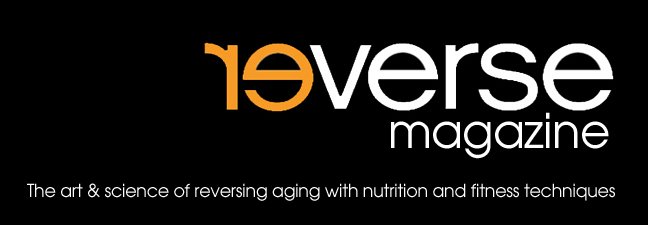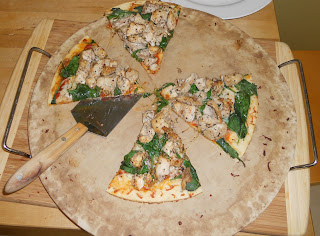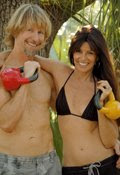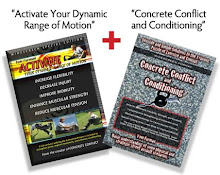Tuesday, December 28, 2010
What's For Dinner?
by Robin White
We really like to try and eat our meals with very little starch, if possible. And if you have ever tried to do this, you start to appreciate why it's so difficult. Everything in restaurants is served with bread wrapped around it, potatoes on the side, garlic rolls, rice, etc.
I think the reason for this is two-fold: It's cheap, so you get filled up without them having to serve you extra steak or protein, which is much more expensive. The other reason, is that we have come to expect it. Most people would scream bloody murder if they went to Outback or Olive Garden and they didn't give them a big loaf of bread to start out the meal. It's like crack for most people, let's face it.
But let's look at this from a health standpoint. White bread is pretty devoid of nutrients, and the calories are tremendous for the little amount you get. Bad on both counts. When you are trying to reduce calories, this is no way to start out the meal.
Additionally, because white bread is like pure sugar in the bloodstream, with nothing to slow it down (like fiber), it will basically make your insulin soar and then crash. When it comes crashing down, guess who's hungry again? It's kind of like being on the "Starch Seesaw"
We say "fill up on protein first" then vegetables, and then add a little low fat cheese and a small glass of wine, just so you don't feel TOO deprived. So this is our strategy at home. Even though we are not overweight, for regular at home meals, we try to keep it basic, and then if we go out once in a while, we can cheat, because then it's more fun.
So, the dinner tonight in the picture consisted 2 salmon patties grilled with seasoning, chopped zucchinis and squash, grilled, with a little low fat skim shredded mozzerella.
Don't forget to take your Fish oil capsules after dinner. Got to keep your omegas high.
Friday, December 17, 2010
Some Low Carb Pizza
OK, How to have your cake and eat it too, so to speak. Here is a high protein, low carb pizza, to be enjoyed with red wine and laughter.
1. Ultra Thin Pizza Crust,.. many varieties available in your local market. This minimizes carbs.
2. Spend some money on a good sauce,.. I like Basil in my sauce,.. you may like garlic or vodka.
3. I use 5 shredded cheese on top the sauce along with Italian herbs.
4. About a pound of protein. In this case, chicken breast cooked in wine and olive oil.
5. A layer of spinach. You may choose peppers or broccoli to get some veggies in there.
6. I top it with grated, fresh mozzarella cheese.
7. It cooks quickly at a high heat. Let cool for 3 minutes, then slice and eat. Drink lots of red wine for the resveratrol and stress reducing components.
Question? Please ask.
1. Ultra Thin Pizza Crust,.. many varieties available in your local market. This minimizes carbs.
2. Spend some money on a good sauce,.. I like Basil in my sauce,.. you may like garlic or vodka.
3. I use 5 shredded cheese on top the sauce along with Italian herbs.
4. About a pound of protein. In this case, chicken breast cooked in wine and olive oil.
5. A layer of spinach. You may choose peppers or broccoli to get some veggies in there.
6. I top it with grated, fresh mozzarella cheese.
7. It cooks quickly at a high heat. Let cool for 3 minutes, then slice and eat. Drink lots of red wine for the resveratrol and stress reducing components.
Question? Please ask.
Monday, December 13, 2010
How To Lose 100 Pounds
Diet or Exercise? Get Real!
Gerry Schiela
Before you continue reading, you should answer a question. Answer this question honestly. Answer this question based upon what you believe, and not what you think anyone else would tell you is the right answer. Answer this question for yourself. Write down your answer, type it, text it, or say it into a recorder, but don’t just say it; it is important to record it.
What is the most important factor in losing weight?
Look at your answer. If your answer was “realism” then you can stop reading and go work out; your work here is finished. However, chances are good you said something else. Chances are that your answer was either diet or exercise. Aren’t these important? Of course they are! When all is said and done, the amount of weight you lose will come down to how much fuel you take in versus how much you burn. It isn’t that these things are not important; they are important for establishing the conditions that will enable you to lose weight, but you need to realize two things: 1) they are both subject to a wide variety of choices; 2) the conditions they establish are variable. If you are not realistic about the conditions you establish, or the choices you make, then you are probably wasting your time in the long run. Lets look at a few of the factors that “realism” will affect.
Commitment and Sustainability
The first thing to be realistic about is your goal. Do you have a goal? If you do, then record it. Was it easy to record? Did you stumble and have trouble writing it? If all you have is a vague notion that you “want to lose weight” or you “want to get in shape,” then you run the risk of milling about through the world of “fitness” and accomplishing little. This will most likely take you as far as going to the movies without being able to decide on a specific flick you want to see—instead you mill about and watch the trailers before each movie and go home. What did you accomplish? You must be realistic about your specific plan. What do you hope to accomplish realistically?
Are you merely overweight? Are you morbidly obese? These considerations will also help you establish a realistic time frame in which to reach your goal. If you need to lose 100+ pounds, and you want to do it in two months without liposuction, then it is time to become realistic. You will not, however, be able to judge whether you are being realistic or not unless you determine a specific set of targets and a goal. Another side benefit is that once you have a well-established goal, then you can share it with others. You can get input and feedback. You can use this to reshape your goal and your training and diet.
Please realize that just because you do have a realistic and established goal, it does not mean it can’t change! Of course you can respond to your situation as it changes. My original goal last spring was to start near the end of June and lose 100 lbs. before my next birthday in August. Due to constraints at my Dr.’s office, I had to wait to start almost two weeks. In five months I have lost 100 lbs. and have adjusted my goal to 150 by August. At this rate, I should make it by February or March. Did I stick slavishly to my goal? Did I simply try to stay at that weight because it was my goal? Get real. Things change in life all the time, adjusting to circumstances is part of living realistically.
One of the most useful things that anyone ever did for me was to give me a book. In 2003, I wanted to lose weight. I asked a friend (D. Anderson, personal communication), who is a professor of psychology specializing in weight loss, and he gave me a copy of the L.E.A.R.N. Program. Right at the beginning there was a checklist to test yourself to see whether you were both committed and ready to lose weight and reach your goal. The first time I took the test I passed with flying colors. Unfortunately, I realized that I was simply giving the answers I knew the quiz creators wanted me to provide. I retook the questionnaire and failed miserably—it was not my time to lose weight. Honestly, that angered me. Some quiz in a book was telling me not to try at this time? So I tried, and failed miserably. I was not ready, and I was not realistic. You need to be sure that you are.
Once you have established a realistic goal, one that you have confirmed with your Dr., or other healthcare professional, you have another question that you need to answer realistically—is my plan sustainable for me? It doesn’t matter if you have a friend who lost 60 lbs. doing a certain exercise program and diet—if YOU cannot commit to that same routine then it is NOT a realistic plan for you. The oracle at Delphi had the following advice for visitors: Know Thyself! You need to establish a realistic plan for yourself. This can be in conjunction with a Dr., a nutritionist, a personal trainer—but in the end you are the one responsible for ensuring that your plan is not only viable, but is also realistic for yourself. Which Dr.? Which nutritionist? Which personal trainer? They are all simply variable conditions that you can establish—there are many different approaches that are all equally “valid,” but not all will be right for you.
Diet? Exercise?
Diet is important for many reasons. Nutrient dense foods can simply be “healthy choices.” No one will claim that diet isn’t one of the most important factors in your weight loss arsenal: it is. There are, however, many healthy and realistic options when it comes to diet. Let’s look at two extremes: 1) you are slightly overweight and simply want to “lose the fat”; 2) someone who is “in shape,” but wants to become like Arnold in Conan the Barbarian. The diet will be very different for each to reach his or her specific goal. There are plenty of choices in between and many differing sets of conditions. In the first case, the only diet you really need is the Analyze This diet: “What kind of sandwich ain’t too fattening?” “A half a sandwich”; eat a little less, move a little more (walk three times a week) is a viable option in a realistic time frame (WeightWatchers would be a good choice for many people here). In case number two, in addition to high-volume exercise, you have to do a lot of high-calorie, protein-rich eating. Both of these are workable and valid options; however, mix and match the conditions between the two, and neither hypothetical person will reach his or her goal. The high calorie requirements for the second choice will not match with “moving a little more,” nor will simply controlling portion size and calorie input work in the second case. Is one “better” than the other? No. Don’t let anyone tell you differently.
The human body is highly adaptable to circumstances—including diet. The recent “Twinkie Diet” or “Convenience Store Diet” shows that in terms of simply losing weight the raw “calorie count” is important—it counts a lot. But is simply losing weight all that you want? I would call that an underdeveloped goal. How much weight? Do you want to be able to maintain the weight you reach over time? How much energy do you want once you reach your goal? What is your ideal body type? All of these things should be considered. A Twinkie diet may help you drop the initial weight, but be realistic: will you have learned enough to maintain and sustain the condition you reach? This is the eternal problem with fad diets; it isn’t that they do not work—most diets can work, at least in the short term, if you follow them strictly—but have you established conditions that you can maintain and sustain over time?
What conditions?
There are many conditions that you should consider in the twin worlds of diet and exercise. The conditions that you establish will define both your health and progress. If losing fat is the only condition you wish to establish, then a no fat, “starvation” diet may seem like the best choice. However, if you entirely eliminate things that you should have in moderation, such as some fat and salt in your diet, you will not only be establishing a condition for losing fat, but you will have established a condition for growing gallstones, or potentially damaging your body’s organs. Being overweight has associated health risks, but is risking your health a condition you want to establish? Even the Twinkie diet professor took vitamin and protein supplements.
There are many choices out there, and too many diets to begin to discuss. If you have a lot of weight to lose, then one of the biggest choices nowadays is whether you want to stay primarily in glycolysis (as in a so-called “sensible” eating plan with portion control, such as following the advice of the food pyramid in which a substantial amount of carbohydrates are consumed) or foster a state of ketosis (such as the Atkins diet, in which carbohydrates are extremely limited.) These are the big choices. Either one can establish the conditions for losing weight, especially when combined with an exercise program. Which is right for you? The one that you can stick with, in conjunction with an exercise program that will put you in a position to maintain health and fitness after you are finished.
This does not mean what some make a habit of claiming—that the diet you choose must be a permanent “lifestyle” change; it only means that whatever path you choose should educate you and foster your ability to establish a healthy lifestyle in the end. I have lost over 100 lbs. so far, but I can tell you right now, I might have lost interest in the process if I were not seeing good results. That is simply how I am. I was not in position to simply change my lifestyle; I wanted to lose weight faster than simple portion control would allow. I researched and found what is right for me—part of being right for me is the process of re-education and learning to develop better habits. In other words, I have established conditions that will take me not only to my weight loss goal, but will have taught me how to maintain it once I reach my goal. My “lifestyle” change will be enacted once I reach my goal.
There are many positions in between the extremes above, those were chosen because they are extremes, and there are plenty of variations within each extreme. The only thing they have in common is that they can all work as advertised if you stick with them. That is why realism is the most important factor. Be realistic about what can work for you. To paraphrase Adam T. Glass’s advice on training, there is no best; there is only what is best for YOU now.
This applies to exercise as well. What exercise will work? The exercise you will stick with. You may know someone for whom Crossfit worked wonders—there are many people like that—however, do you have the commitment and drive it requires? Kettlebell workouts produce incredible results, but if your kettlebell is just another curious dust collector, it will do you no good. Simple walking several times a week is probably all people who need to drop a little weight really need—and even for those who need to drop more it can work wonders over an extended period of time.
You must establish realistic expectations for your goals within a realistic time frame. Increasing your walking can work wonders, but will it work it in the time frame you have established for you goal? On the other hand, if you are extremely out of shape, then you should not simply jump past basic exercises to more strenuous ones. Know thyself. Re-educating yourself, in both diet and exercise, is as important as re-shaping yourself if you have become extremely overweight or obese over time. Be realistic about not only choosing what exercise program appeals to you, but about which exercise program is a realistic choice for you now. As Tom Furman told me near the beginning, “Take it slow, don’t risk exploding your valentine” (personal communication).
Record Keeping
If you are like me, then you hate keeping records, and it does not come easy. Unfortunately, it can be very important. Why? It keeps you honest as well as realistic. If we can track our successful weeks then it will guide how we reproduce them, or enhance them. Perhaps more importantly, if we track our less successful weeks then we can learn what to avoid. If we are not keeping records it is too easy to kid ourselves. It wasn’t the extra cheese, or the brownies, or whatever that slowed us down, it was [insert your excuse of the week]. If you keep track of what you eat, as well as your exercise, then you have a means to analyze it, and correlate your progress to the conditions you established.
Not all record keeping is created equal. Raw numbers do not mean much on their own. You may record that you are performing 3x15 squat sets at a certain weight, but if you are not losing weight, or gaining strength, then all you are doing is spending time recording something that is insignificant on its own. If you can measure the impact of your action against your goal—weight loss/weight gain, etc.—then you are in position to keep realistic records from which you can learn.
Record keeping can go beyond simply filling out charts. For example, given my hatred of the act, I have chosen a program in which my progress is charted for me. My overall weight, my fat loss, muscle loss, visceral fat etc. is all tracked. On my own I use Facebook posts to discuss what I am doing and correlate it to my progress. This works for me, and it keeps me honest and realistic. I know exactly how difficult it was to recover from my Thanksgiving “cheat” and why. I can use that information to either inspire me not to cheat, or to learn what is necessary to recover from a setback.
The Bottom Line
There is only one reality that can be considered a universal law in weight loss; everything else is up for grabs. Everything else is a matter of choices and establishing the conditions that will help you reach your goals. These variables are important because they will help you do it faster, more efficiently, and tailor your program to yourself, but they remain variables. The only immutable rule? Burn more usable fuel than you consume and you will lose weight. Accept responsibility for this. Be realistic about this. Be realistic about the conditions you establish around this.
Reference List
Brownell, Kelly D. (2000). The LEARN® Program for Weight Management 2000. Dallas, TX: American Health Publishing Company.
Glass, Adam T. & Nelson, Brad. (2010). Grip n Rip 2.1. (DVD).
Park, Madison. (2010). Twinkie diet helps nutrition professor lose 27 pounds. CNNHealth. Retrieved from: http://www.cnn.com/2010/HEALTH/11/08/twinkie.diet.professor/index.html
Thursday, December 9, 2010
Lose Those Holiday Pounds!
Now, before you are committed to the impossible burden of a New Years Resolution to lose weight, start now with the simple, streamlined, and effective method to lose Holiday Pounds.
-- Doing hours of exercise? Think again!
-- Getting up extra early? Not on this program!
-- Boring meals? The luxury of steak, wine, and even guacamole!
-- Repetitive exercise? How does variety sound?
-- Give up carbs? You must be kidding?
-- Six meals a day? You'll run out of dental floss!
Rather than end the holidays packing yourself into your loose clothing, start the New Year with a lean, hard, body and energy in abundance!
Do yourself a favor and buy yourself the Christmas gift that will separate this year from all the others!
All this for only 5 Dollars!
Buy now!
Tuesday, December 7, 2010
IS This the Cure for Skin Cancer? MELANOTAN!
Haven't heard of Melanotan? Well here's the WikiPedia version: http://en.wikipedia.org/wiki/Melanotan_II
Please read this data carefully. It is hopeful but not definitive by any means.
This drug works by stimulating your own Melanin production. The body's protection against UV rays is the darkening of the skin via pigment. The advanced version is a actually sexual stimulant. Currently, only the injectable form is valid. It is "not generally recognized as safe", so it will be a while before you can buy this at a drug store.
The next version of the drug will be a sexual stimulant for both men and women.
The future in anti aging and skin cancer prevention has a drug that get you tan, prevents cancer and enhances your sex life.
Please read this data carefully. It is hopeful but not definitive by any means.
This drug works by stimulating your own Melanin production. The body's protection against UV rays is the darkening of the skin via pigment. The advanced version is a actually sexual stimulant. Currently, only the injectable form is valid. It is "not generally recognized as safe", so it will be a while before you can buy this at a drug store.
The next version of the drug will be a sexual stimulant for both men and women.
The future in anti aging and skin cancer prevention has a drug that get you tan, prevents cancer and enhances your sex life.
Subscribe to:
Posts (Atom)












